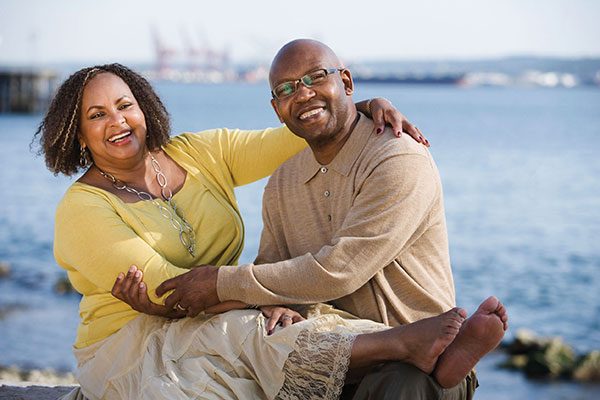Your Most Personal Questions about Post-Cancer Relationships and Intimacy, Answered
by Andrea Bradford, PhD, and Elizabeth Conti, PhD
As psychologists who work with cancer survivors, we often address concerns about cancer’s effect on relationships and intimacy. Here are our answers to some of the most frequently asked questions from cancer survivors and their partners.
Since my prostate cancer surgery, I rarely feel “in the mood” to be intimate with my wife. Even when I do, I have problems getting and keeping an erection. Why does this happen and what can I do?
Most men who have surgery for prostate cancer experience loss of erectile function, which may recover with treatment over one to two years after surgery. Men who go on to receive androgen deprivation therapy (also known as hormone therapy for prostate cancer) are more likely to experience a decrease in desire for sex due to lowered testosterone.
Multiple treatments are available for erectile dysfunction, and we encourage you to explore all those options with your treatment team. However, be aware that not all sexual difficulties are due to physical issues – changes in mood, worries about sexual performance, and relationship difficulties can all contribute to low sexual desire. It is important to communicate openly with your partner and explore a range of ways to be intimate. Taking the pressure off “performing” can be immensely helpful. Perhaps you and your wife would enjoy a bath together or a massage, deep kissing, caressing, or more time cuddling. Whatever you choose, maintaining some type of physical intimacy can help to sustain that part of your relationship for the future.
My husband has been diagnosed with stage IV colon cancer. He also has other health problems and recently has become more reliant on me to take care of him. I didn’t expect to be his caregiver so soon, and it’s putting a strain on our marriage. I can tell he doesn’t want to be a burden. What should I do?
Caregiving is a hard job, even when you’re caring for the ones you love the most. Although you won’t be able to entirely separate your roles as a spouse and as a caregiver, it can be helpful to think about how you can cultivate both aspects of your relationship.
Consider ways to continue doing some of the things you used to enjoy as a couple by adjusting how you do them. For example, if you enjoyed going out to dinner and seeing movies together before cancer, you could now try having a movie night at home instead. This may also be a good time for a break from conversations about illness or care.
In addition, make sure you carve out time for yourself to socialize, exercise, and relax. Try to avoid caregiving alone. When you can, invite friends and family to spend time with you and your husband. If you would like to be intimate, strive to have an open conversation about when the best time might be (perhaps not right before or after caregiving activities) and about what types of intimacy would be mutually desirable. Finally, take advantage of local support groups and opportunities for respite care.
I don’t have a partner right now. I’d eventually like to date, but the idea of dating already makes me nervous. How can I explain my history of cancer to someone I’ve just met – and not scare them off?
When and how to disclose your medical history is a personal decision. Some people opt to disclose early in the relationship to avoid investing time and energy into a partner who would not be accepting. However, it is perfectly fine to wait to disclose your cancer history until you have a stronger bond and sense of trust. As a cancer survivor, you are under no more obligation to be an “open book” than anyone else is.
When you are ready to tell a dating partner about your cancer history, choose an occasion when you are both relaxed and have sufficient time and privacy. You need not disclose everything all at once. Just divulging the fact of having had cancer may be enough to open the conversation; further details can be left for another time. Allow your partner some time to process this information. Meanwhile, make sure you have support available from a trusted friend or loved one as you navigate this conversation.
My oncology team prepared me for a lot of side effects from chemo and radiation, but one thing I wasn’t prepared for was how painful sex would become! I was not ready for this at all. No one else seems to have this problem – what is wrong with me?
Painful sexual activity is an unexpected side effect of many cancer treatments, including pelvic or abdominal surgery, radiation to the pelvic area, chemotherapy, and hormone therapy. In some cases, pain may be a short-term side effect of treatment that improves over time (for example, recovery from pelvic surgery or acute inflammation from pelvic radiation). However, if a problem has persisted for more than a month or two, it is reasonable to seek further evaluation and treatment. A medical evaluation by a gynecologist (or a urologist, for men with sexual pain) is a good start. Some large cancer centers have specialized sexual health programs. Other sources of information and referrals include the American Cancer Society (cancer.org), the North American Menopause Society (menopause.org), and the Society for Sex Therapy and Research (sstarnet.org).
I’m happy that my treatment has brought my disease under control, but the truth is I’m still tired a lot of the time and don’t feel the way I did before I was diagnosed. I also find myself irritable and on edge much of the time. I worry that my partner is getting frustrated. How do I explain what I’m going through?
Cancer is often accompanied by “invisible illness” that can last months or years. Consequently, it can be difficult to share in your loved one’s excitement about a good prognosis or the completion of treatment when you are still struggling to feel like yourself.
You can’t read your partner’s mind, so it’s important to share your concerns with your partner when you feel out of sync. Though you might be tempted to say something like “you’re expecting too much of me – you don’t know what I’m going through,” this will put your partner on the defensive. Instead, try to express your thoughts using first-person language. For instance: “I’m still having a lot of difficulty getting things done, and I’m worried that you’re frustrated with me because I don’t have the energy I used to.”
A relationship functions in some ways like a bank account. You’re going to make withdrawals (demands, needs, unpleasant emotions, poor choices of words) every so often. The stress of cancer might increase these withdrawals, so making deposits when you can is especially important. Deposits in your relationship might be kind words, physical affection, little surprises, favors, or even everyday tasks.
Worries about relationships and intimacy are common sources of distress for cancer survivors. Being aware of your concerns and feelings, being able to express them effectively in your relationship, and seeking outside support and help when needed can go a long way toward enhancing your relationship.


Dr. Andrea Bradford (left) is a clinical health psychologist at Baylor College of Medicine in Houston, TX. You can find her on Twitter at @abradfordphd.
Dr. Elizabeth Conti is a clinical psychologist at the Michael E. DeBakey VA Medical Center in Houston, TX.
This article was published in Coping® with Cancer magazine, July/August 2019.


